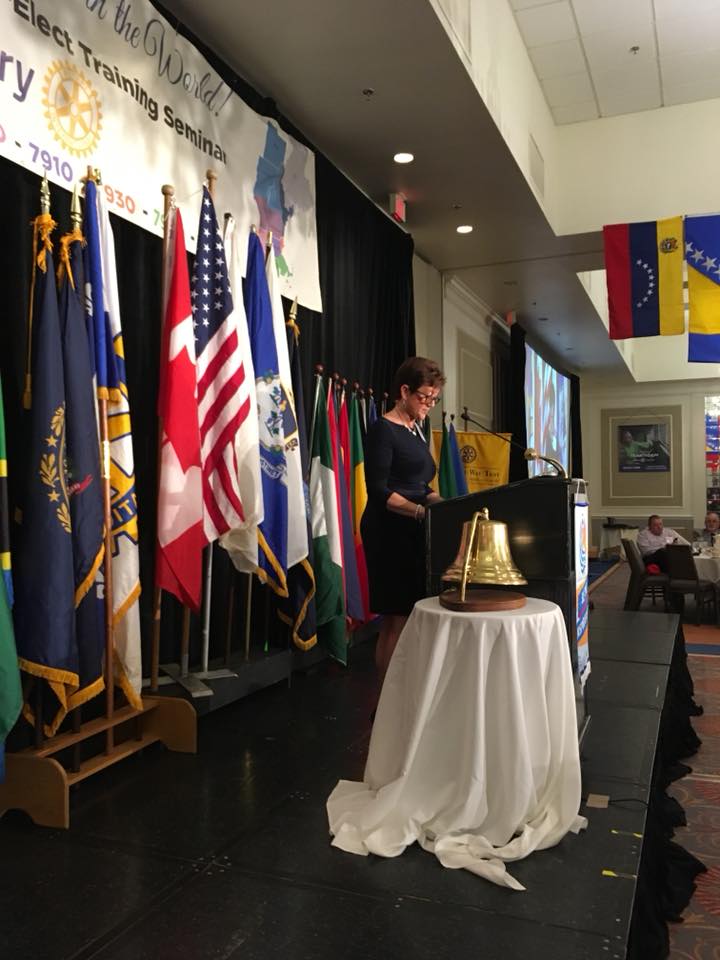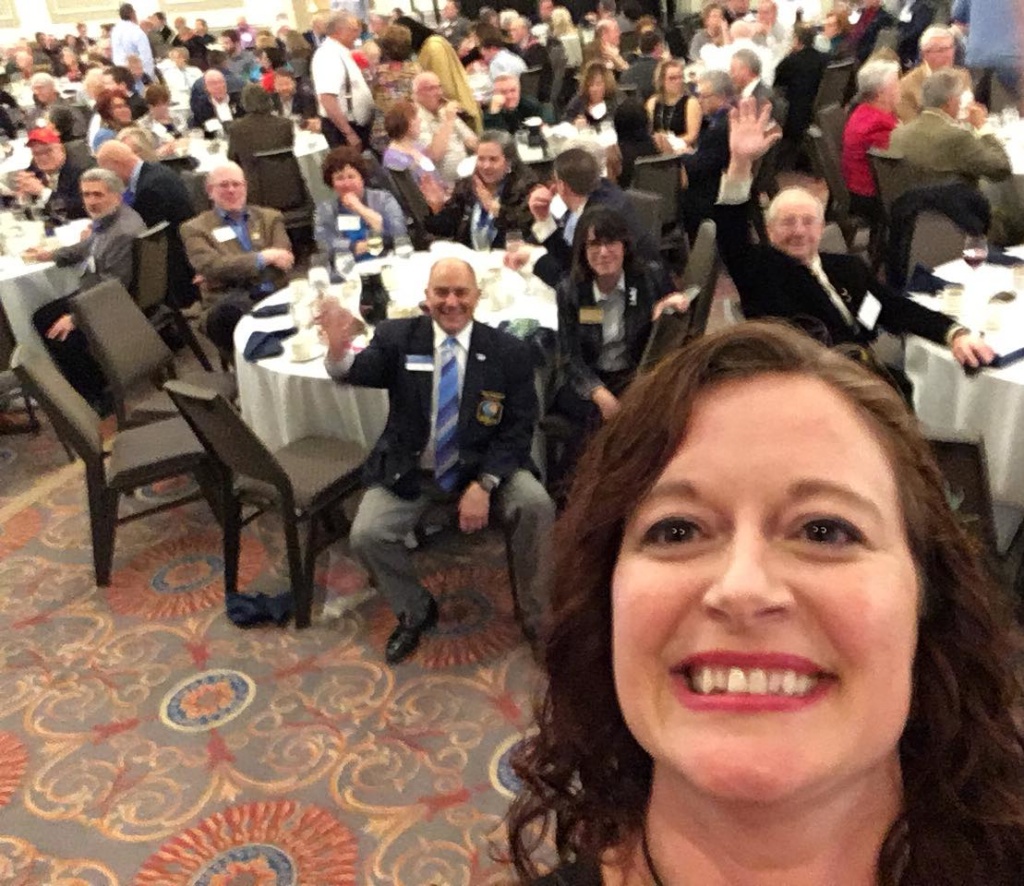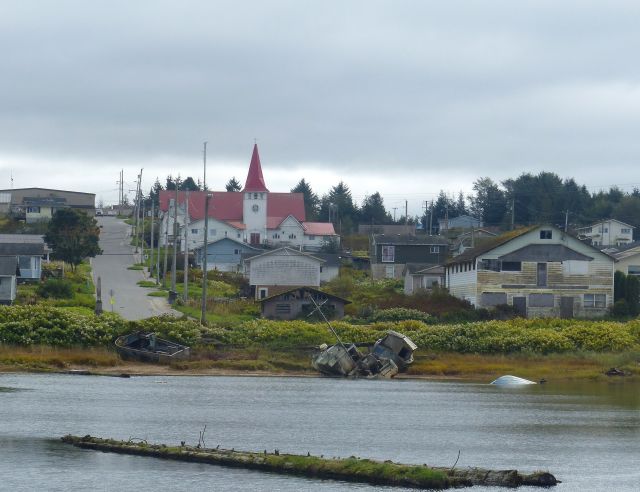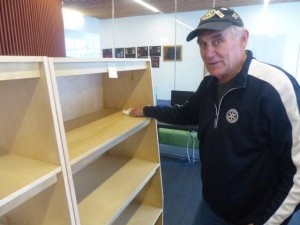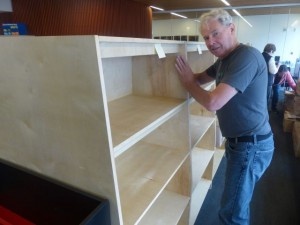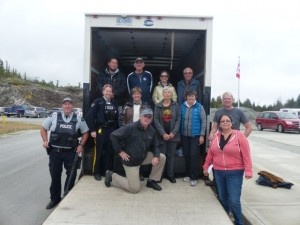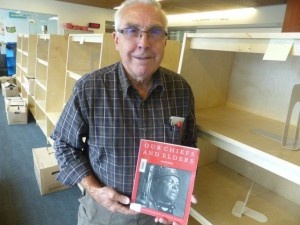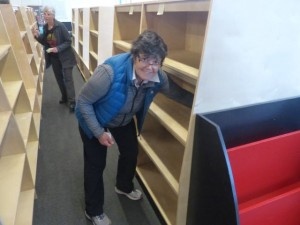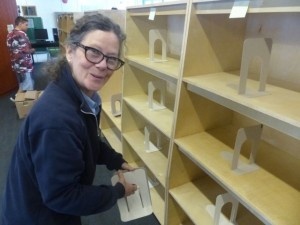Members of the Mission Rotary club recently delivered shelving to the Write to Read library located in the school in the village of Lax Kw’alaams. Simple enough, or so it sounds. The reality was a little different. Here’s how it went.
Books had already been stored in the Write to Read storage facility in Richmond and sent separately. The shelving had been hand made by aboriginal inmates at the Nanaimo Correctional facility and put in storage at a dept there. The Rotarians rented a large truck from Enterprise Rent a Car and two of them drove it to Horseshoe Bay, boarded the ferry and cruised over to Nanaimo. Four other Rotarians drove a family van over.
They all went to the storage facility and loaded the truck, a challenge in itself, because the shelving took up the entire space in the truck, stacked high to the ceiling. Then it was off to the first pit stop, Campbell River, a group dinner and an overnight rest in a motel. Up early the next morning, it was a long drive to Port Hardy. The ferry to Prince Rupert didn’t sail, so they checked in with the Fort Rupert First Nation band, where a library had been opened last year. Being a Saturday, the library was closed but they visited with local First Nations people, who said the library had been converted to a classroom for a semester but was being cleaned and returned to use as a library.
 BC Ferries requires all passengers and vehicles to arrive at 4 pm for a 6 pm sailing, where security proved to be as tight as any airport, with multiple checks of identification. Dinner onboard, a World Cup hockey game on the screen in the theatre, then an attempt at some sleep. All cabins had been booked by tourists a year ago, so the choice was the floor or a reclining chair. It was 22 hours to Prince Rupert in rain with not much scenery, an endurance test for all concerned. Anyone taking the Northern Adventure up the Inside Passage will find it an adventure indeed, if only to somehow get through the evening and find some way to sleep.
BC Ferries requires all passengers and vehicles to arrive at 4 pm for a 6 pm sailing, where security proved to be as tight as any airport, with multiple checks of identification. Dinner onboard, a World Cup hockey game on the screen in the theatre, then an attempt at some sleep. All cabins had been booked by tourists a year ago, so the choice was the floor or a reclining chair. It was 22 hours to Prince Rupert in rain with not much scenery, an endurance test for all concerned. Anyone taking the Northern Adventure up the Inside Passage will find it an adventure indeed, if only to somehow get through the evening and find some way to sleep.
Arrival in Prince Rupert and checking in with several billets and a hotel around the town. The ferry to Rupert only sails once a year in the off season, and the ferry to Lax Kw’alaams from Prince Rupert was out of service, so it was a two day wait in Rupert before boarding a barge that the village is using until the repairs to the ferry are completed.
 The barge sails early, so it was up before dawn to get to the dock, first come first served. Cold and wet in the rain, the barge was pushed by a tug up an inside passage away from the ocean for an hour, landing at Tuck Inlet. The road to Lax Kw’alaams had traditionally been a rough logging road, hellish in the winter to drive with huge potholes. On this Rotary expedition the road was finally being paved, requiring some jockeying and careful driving of the big truck among work crews.
The barge sails early, so it was up before dawn to get to the dock, first come first served. Cold and wet in the rain, the barge was pushed by a tug up an inside passage away from the ocean for an hour, landing at Tuck Inlet. The road to Lax Kw’alaams had traditionally been a rough logging road, hellish in the winter to drive with huge potholes. On this Rotary expedition the road was finally being paved, requiring some jockeying and careful driving of the big truck among work crews.
New pavement made for easier driving and less than an hour to the village. It was easy to see how difficult it must have been for the Lax villagers for many years to get to Rupert to buy groceries. There is almost nothing to buy in the village except for a few small shops in people’s houses. There is a school and rec centre (great swimming pool) and not much else. No main street, no grocery, no gas station, no bank, no hotel or community centre or any amenities of any sort.
There are two bed and breakfasts in the village, with the entire Rotary team taking up residence in one, a 5 bedroom, one bath home run by a pleasant couple. Lovely view, but another challenge for 9 people to share one bathroom. But the Rotary crew were too busy to spend much time at the B&B because unloading the truck at the school and putting books on shelves and coding them took two full days of labour.
The road was out of service on Thursday because of paving on the way back, so the only escape was by water taxi on the open ocean, threatened to be shut down by heavy winds and rough seas. Most of the team stayed until Friday, then drove back to Tuck Cove and took the barge to Rupert, then drove both the van and truck back to Mission via Prince George, a two-day adventure in itself. Total time getting there and back? One full week, showing just how remote and difficult to access many First Nations communities really are to access. Full marks for the Rotary volunteers for a job well done.
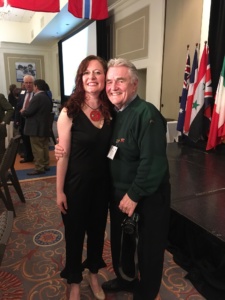 So honoured and humbled by this opportunity to share My Rotary Story and the Write to Read Project. The NEPETS family did it again – not only did the incoming President-Elect class of 2018-2019 again give me money from their own pockets BUT the 2017-2018 District Governors represented will also be making donations! The approximate $2500 gift from these amazing Rotary Leaders plus the DGs donations will be leveraged into the W2R-BC’s first Rotary Foundation GLOBAL GRANT!! Hopefully the first of many
So honoured and humbled by this opportunity to share My Rotary Story and the Write to Read Project. The NEPETS family did it again – not only did the incoming President-Elect class of 2018-2019 again give me money from their own pockets BUT the 2017-2018 District Governors represented will also be making donations! The approximate $2500 gift from these amazing Rotary Leaders plus the DGs donations will be leveraged into the W2R-BC’s first Rotary Foundation GLOBAL GRANT!! Hopefully the first of many ![]() ?This will enable us to build the first community designed culturally responsive community gathering space to build literacy equity WITH Xeni Gwet’in.
?This will enable us to build the first community designed culturally responsive community gathering space to build literacy equity WITH Xeni Gwet’in.![]()
